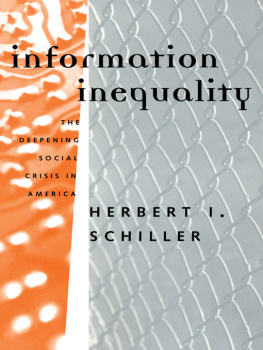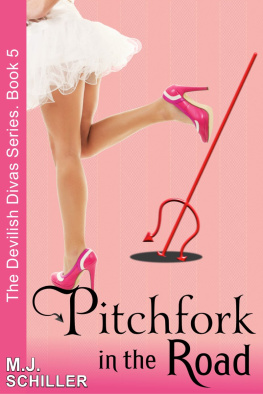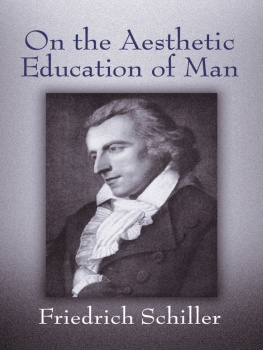Schiller Friedrich von - Aesthetical Essays
Here you can read online Schiller Friedrich von - Aesthetical Essays full text of the book (entire story) in english for free. Download pdf and epub, get meaning, cover and reviews about this ebook. genre: Science. Description of the work, (preface) as well as reviews are available. Best literature library LitArk.com created for fans of good reading and offers a wide selection of genres:
Romance novel
Science fiction
Adventure
Detective
Science
History
Home and family
Prose
Art
Politics
Computer
Non-fiction
Religion
Business
Children
Humor
Choose a favorite category and find really read worthwhile books. Enjoy immersion in the world of imagination, feel the emotions of the characters or learn something new for yourself, make an fascinating discovery.
- Book:Aesthetical Essays
- Author:
- Genre:
- Rating:5 / 5
- Favourites:Add to favourites
- Your mark:
- 100
- 1
- 2
- 3
- 4
- 5
Aesthetical Essays: summary, description and annotation
We offer to read an annotation, description, summary or preface (depends on what the author of the book "Aesthetical Essays" wrote himself). If you haven't found the necessary information about the book — write in the comments, we will try to find it.
Aesthetical Essays — read online for free the complete book (whole text) full work
Below is the text of the book, divided by pages. System saving the place of the last page read, allows you to conveniently read the book "Aesthetical Essays" online for free, without having to search again every time where you left off. Put a bookmark, and you can go to the page where you finished reading at any time.
Font size:
Interval:
Bookmark:
The Project Gutenberg EBook of The Aesthetical Essays, by Frederich Schiller
This eBook is for the use of anyone anywhere at no cost and with
almost no restrictions whatsoever. You may copy it, give it away or
re-use it under the terms of the Project Gutenberg License included
with this eBook or online at www.gutenberg.net
Title: The Aesthetical Essays
Author: Frederich Schiller
Release Date: October 26, 2006 [EBook #6798]
Language: English
*** START OF THIS PROJECT GUTENBERG EBOOK THE AESTHETICAL ESSAYS ***
Produced by Tapio Riikonen and David Widger
INTRODUCTION. VOCABULARY OF TERMINOLOGY. LETTERS ON THE AESTHETICAL EDUCATION OF MAN. LETTER I. LETTER II. LETTER III. LETTER IV. LETTER V. LETTER VI. LETTER VII. LETTER VIII. LETTER IX. LETTER X. LETTER XI. LETTER XII. LETTER XIII. LETTER XIV. LETTER XV. LETTER XVI. LETTER XVII. LETTER XVIII. LETTER XIX. LETTER XX. LETTER XXI. LETTER XXII. LETTER XXIII. LETTER XXIV. LETTER XXV. LETTER XXVI. LETTER XXVII. THE MORAL UTILITY OF AESTHETIC MANNERS. ON THE SUBLIME. THE PATHETIC. ON GRACE AND DIGNITY. ON DIGNITY. LIMITATIONS IN THE USE OF BEAUTY OF FORM. THE VULGAR AND LOW ELEMENTS IN WORKS OF ART. REFLECTIONS ON DIFFERENT QUESTIONS OF AESTHETICS. ON SIMPLE AND SENTIMENTAL POETRY. SENTIMENTAL POETRY. SATIRICAL POETRY. ELEGIAC POETRY. IDYL. THE STAGE AS A MORAL INSTITUTION. ON THE TRAGIC ART. THE PLEASURE WE DERIVE FROM TRAGIC OBJECTS. |
The special subject of the greater part of the letters and essays of Schiller contained in this volume is Aesthetics; and before passing to any remarks on his treatment of the subject it will be useful to offer a few observations on the nature of this topic, and on its treatment by the philosophical spirit of different ages.
First, then, aesthetics has for its object the vast realm of the beautiful, and it may be most adequately defined as the philosophy of art or of the fine arts. To some the definition may seem arbitrary, as excluding the beautiful in nature; but it will cease to appear so if it is remarked that the beauty which is the work of art is higher than natural beauty, because it is the offspring of the mind. Moreover, if, in conformity with a certain school of modern philosophy, the mind be viewed as the true being, including all in itself, it must be admitted that beauty is only truly beautiful when it shares in the nature of mind, and is mind's offspring.
Viewed in this light, the beauty of nature is only a reflection of the beauty of the mind, only an imperfect beauty, which as to its essence is included in that of the mind. Nor has it ever entered into the mind of any thinker to develop the beautiful in natural objects, so as to convert it into a science and a system. The field of natural beauty is too uncertain and too fluctuating for this purpose. Moreover, the relation of beauty in nature and beauty in art forms a part of the science of aesthetics, and finds again its proper place.
But it may be urged that art is not worthy of a scientific treatment. Art is no doubt an ornament of our life and a charm to the fancy; but has it a more serious side? When compared with the absorbing necessities of human existence, it might seem a luxury, a superfluity, calculated to enfeeble the heart by the assiduous worship of beauty, and thus to be actually prejudicial to the true interest of practical life. This view seems to be largely countenanced by a dominant party in modern times, and practical men, as they are styled, are only too ready to take this superficial view of the office of art.
Many have indeed undertaken to defend art on this score, and to show that, far from being a mere luxury, it has serious and solid advantages. It has been even apparently exaggerated in this respect, and represented as a kind of mediator between reason and sense, between inclination and duty, having as its mission the work of reconciling the conflicting elements in the human heart. A strong trace of this view will be found in Schiller, especially in all that he says about the play-instinct in his "Aesthetical Letters."
Nevertheless, art is worthy of science; aesthetics is a true science, and the office of art is as high as that assigned to it in the pages of Schiller. We admit that art viewed only as an ornament and a charm is no longer free, but a slave. But this is a perversion of its proper end. Science has to be considered as free in its aim and in its means, and it is only free when liberated from all other considerations; it rises up to truth, which is its only real object, and can alone fully satisfy it. Art in like manner is alone truly art when it is free and independent, when it solves the problem of its high destinationthat problem whether it has to be placed beside religion and philosophy as being nothing else than a particular mode or a special form of revealing God to consciousness, and of expressing the deepest interests of human nature and the widest truths of the human mind.
For it is in their works of art that the nations have imprinted their favorite thoughts and their richest intuitions, and not unfrequently the fine arts are the only means by which we can penetrate into the secrets of their wisdom and the mysteries of their religion.
It is made a reproach to art that it produces its effects by appearance and illusion; but can it be established that appearance is objectionable? The phenomena of nature and the acts of human life are nothing more than appearances, and are yet looked upon as constituting a true reality; for this reality must be sought for beyond the objects perceived immediately by the sense, the substance and speech and principle underlying all things manifesting itself in time and space through these real existences, but preserving its absolute existence in itself. Now, the very special object and aim of art is to represent the action and development of this universal force. In nature this force or principle appears confounded with particular interests and transitory circumstances, mixed up with what is arbitrary in the passions and in individual wills. Art sets the truth free from the illusory and mendacious forms of this coarse, imperfect world, and clothes it in a nobler, purer form created by the mind itself. Thus the forms of art, far from being mere appearances, perfectly illusory, contain more reality and truth than the phenomenal existences of the real world. The world of art is truer than that of history or nature.
Nor is this all: the representations of art are more expressive and transparent than the phenomena of the real world or the events of history. The mind finds it harder to pierce through the hard envelop of nature and common life than to penetrate into works of art.
Two more reflections appear completely to meet the objection that art or aesthetics is not entitled to the name of science.
It will be generally admitted that the mind of man has the power of considering itself, of making itself its own object and all that issues from its activity; for thought constitutes the essence of the mind. Now art and its work, as creations of the mind, are themselves of a spiritual nature. In this respect art is much nearer to the mind than nature. In studying the works of art the mind has to do with itself, with what proceeds from itself, and is itself.
Thus art finds its highest confirmation in science.
Nor does art refuse a philosophical treatment because it is dependent on caprice, and subject to no law. If its highest aim be to reveal to the human consciousness the highest interest of the mind, it is evident that the substance or contents of the representations are not given up to the control of a wild and irregular imagination. It is strictly determined by the ideas that concern our intelligence and by the laws of their development, whatever may be the inexhaustible variety of forms in which they are produced. Nor are these forms arbitrary, for every form is not fitted to express every idea. The form is determined by the substance which it has to suit.
Font size:
Interval:
Bookmark:
Similar books «Aesthetical Essays»
Look at similar books to Aesthetical Essays. We have selected literature similar in name and meaning in the hope of providing readers with more options to find new, interesting, not yet read works.
Discussion, reviews of the book Aesthetical Essays and just readers' own opinions. Leave your comments, write what you think about the work, its meaning or the main characters. Specify what exactly you liked and what you didn't like, and why you think so.










